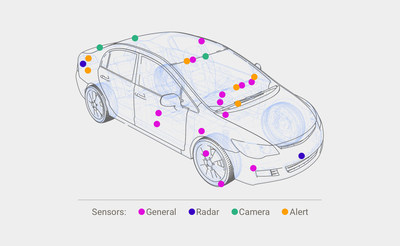
SAN FRANCISCO, March 29, 2018 /PRNewswire/ -- Esurance recently interviewed consumers about their car's data and its use. What became obvious from these conversations was that, when it comes to connected-car technology, many drivers don't have a clear view of what data their car is sharing. To help separate fact from fiction, Esurance then asked automotive technology experts to weigh in on some of the top areas of confusion and concern.


Interestingly, consumers are often equally unclear as to whether or not their vehicles are tracking data in the first place. Many think that only newer cars have the ability to capture data. However, according to experts, if a car was built after 2014, it's beaming back info to carmakers about consumers' driving patterns, the roads they travel, the music they listen to, and pretty much everything their car does.
Esurance asked consumers for their thoughts about what data their car is sharing. Watch the video here: https://www.youtube.com/watch?v=6S29bC3aIJ4.
Consumer beliefs about car data
Based on interviews and research, Esurance uncovered the following consumer beliefs:
- Only newer, expensive cars are "connected cars." (a myth)
- A hacker could disable my brakes. (a reality)
- Data collected from cars is trivial compared to other sources. (a myth)
- My data is being collected even though I never gave permission for that. (a reality)
- I turned off Wi-Fi in my car, so it's not connected. (a myth)
To clarify consumer beliefs about car data, Esurance spoke to experts on three major areas of concerns:
- Data from connected cars
- Issues of data privacy and hacking
- Promises of safer roads in the future
Data from connected cars
Car companies use the data from connected cars to improve designs and discover potential manufacturing defects. "The promise of all this data is a much better experience - keeping us safer, but also creating new opportunities for connection," says David Bader, chair of Georgia Tech's School of Computational Science and Engineering.
Connected cars will soon communicate with roadside infrastructure, sending data about problems such as pot holes, bad weather, and accidents. Roadside infrastructure, such as cellular-enabled black boxes attached to street lights, bridges, and traffic lights, is needed to implement this technology at a wide scale. "The idea of a traffic jam goes away," says tech futurist Gray Scott, explaining that cars will be rerouted automatically based on their destination, keeping traffic moving at the right pace and spaced to prevent accidents.
Data privacy and hacking
In 2017, two senators introduced the SPY Car Act, establishing federal standards to secure cars and protect drivers' privacy, but it hasn't yet gained traction. "We are in the gold rush of data right now – it's basically who can dig it up first," says Gray Scott. Until laws are passed that govern how this information can be used, it's unclear to consumers what car companies are doing with their data. Still, carmakers know that a news-making hack is devastating to business and are protecting data accordingly. Right now, driving a connected car is safe, can improve the driving experience, and could even save drivers money on insurance.
The promise of safer roads
The exchange of information between cars will enable the leap to driverless vehicles. "It's once we get to fully or highly autonomous connected vehicles that we will see the greatest safety benefits of connected cars," says Matthew Channon, author of The Law and Driverless Cars. In the coming decades, autonomous, driverless cars will be commonplace and we may not even own our cars. "In the future, connected autonomous vehicles will be literally taxis," says Channon. "You walk outside your door, you hail it, and it takes you where you want to go."
"One of the biggest promises of shared data is that it will make driving and our roads safer," said Stephanie Braun, director, connected car at Esurance. "While connected-car technology is still in its infancy, there's an exciting future ahead that will bring us driverless cars, transforming our lives on the road for the better."
To learn more about car data myths and realities, please visit www.esurance.com/car-data.
About Esurance®
Esurance, insurance for the modern world®, provides auto, homeowners, motorcycle, and renters insurance direct to consumers online and over the phone. With an easy-to-use mobile app, helpful online tools like photo claims and Coverage Counselor®, and knowledgeable experts, Esurance is the smart choice for today's web-savvy consumer. And as a member of the Allstate family with an A+ rating from A.M. Best*, Esurance offers auto and home insurance that's just a click, call, or tap away.
Press releases and more information about Esurance are available at www.esurance.com.
Media Contact:
Dolleen Cross
[email protected]
415-875-4722
*Esurance Insurance Company and Esurance Property and Casualty Insurance Company have A+ u positive ratings. Esurance Insurance Company of New Jersey has an A rating. Ratings effective as of October 2017. Click here for a guide to A.M. Best's Credit Ratings™. Allstate products are not available through Esurance.
SOURCE Esurance

Share this article